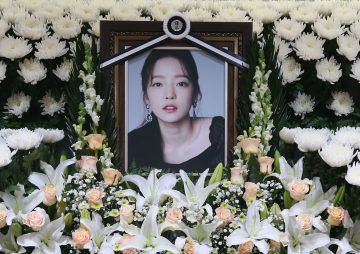
26-year-old Korean actress Song Yoo-Jung was reported to have been found dead in her apartment in Seoul, South Korea on the January 23 according to her affiliated representation, Sublime Artist Agency. The agency declared her death on the January 25, 2021 through an Instagram post.
“Actress Song Yoo-Jung has left us,” Sublime Agency said in their Instagram post caption, “Yoo-Jung was a confidant who radiated happiness with a blithe smile, and an astounding talent who staged with avidity.” Numerous news reports that were previously published in South Korea divulged that Song had passed of suicide. While Sublime Artist Agency did confirm Song Yoo-Jung’s passing, the brand abstained from disclosing the cause of her death. Though the cause of Song’s death remains debatable, her sudden death prompted many to recount back to the many suicides amongst Korean celebrities in recent years.
Reasons for such misfortunes can be repeatedly classified into three groups, “Pressurization from Agencies”, “Cyberbullying”, and “Mental Illness”. Pressurization amongst talent representations or peripheral ventures is not a well-addressed problem amongst entertainment and commercial industries. Celebrities, especially South Korean luminaries, are oftentimes portrayed in a manner in which they appear attractive and relatively joyous in commercials and films. Nevertheless, it is an indubitable fact that some are concealing their genuine selves behind layers of vigorously applied greasepaint; a rigid veneer of gaiety and charm only hide moments of recession and gloom.
Such celebrity suicide incidents exemplify the “butterfly effect”, in which a meager change that may seem almost trite and inconsequential to the individual conducting the change, can result in detrimental changes for another person. Small hateful comments towards a celebrity may seem insignificant at first, but as such loathsome and hate-intended remarks accumulate, disastrous events may be engendered. Furthermore, celebrity suicides help to accentuate the notion that no matter how small or how insignificant one’s actions or remarks may be, even the smallest of changes can be attributable to catastrophic and almost life-ending events, as clearly evident in most of the deaths indicated in this article.
Pressurization from Agencies
One factor that is often attributable to the prompting of suicides amongst celebrities is pressurization from talent representations or celebrity agencies. Numerous reported cases of celebrity suicide have been associated with mass coercion.
Lee Eun Ju, a South Korean actress hung herself in her apartment in Seoul in 2005. At the young age of 24, she left the toxic film industry of South Korea with a suicide note written in her blood, discussing the mass constraints she had to face while appearing in features, such as how she was pressurized to take part in a nude movie scene in her final work “The Scarlet Letter”, of which she did not want to partake in.
In addition to the coercing of part-taking in unwanted films, K-pop idols and trainees have also been fatal victims to mass pressurization from their talent industry agencies. K-pop artist Amber Liu, former rapper of the Korean girl group f(x), discussed her own experiences with South Korea’s toxic K-pop idol industry.
She reported that if a trainee failed to conform to the weight criterion of agencies, they would most likely get cut off. She expressed her dissatisfaction with how K-pop idols are frequently instructed to do things in a certain way, adjured to say things that aren’t necessarily what they genuinely wish to say, and ordered to think in the fashion of what their agencies want them to think. Consequently, such persistent occurrences of pressurizations may act as a root for the prompting of suicidal ideations amongst young Korean celebrities and idols.
Cyberbullying and Korea’s Malignant Netizen Culture
South Korea’s malignant netizen culture has been in the limelight in recent years after numerous suicide deaths of South Korean celebrities over such virulent online gossip.
In 2008, South Korean actress Choi Jin Sil committed suicide after being bestowed “The Nation’s Actress” and winning numerous accolades for her acting. Choi unwittingly witnessed the killing of her former agency manager who held a leading name in South Korea’s entertainment industry in 1994. After the death of her former executive, rumors and speculation regarding their presumed secretive affair germinated on social media. The cause of her suicide was attributable to public provocation engendered from living as a spouseless, employed luminary.
Choi Sulli, a former member of the South Korean girl group f(x) also committed suicide. Comparable to Choi, Sulli had been a victim of incessant denunciation from South Korean netizens. A large portion of these loathsome online comments was concerning Sulli’s appearance, her portrayal in the K-pop entertainment industry, and her decision to join feminist advocative charities. During a live stream, she pleaded for netizens to cease their expressions of loathe towards her and her career.
“I was deeply saddened by the sudden departure of Sulli,” said Hannah K., a freshman at AISG. “I was, and still am, incensed by the extent in which some individuals decide to control the lives of celebrities. Just because something about the celebrity upsets them or fails to accord to their sentiment, doesn’t necessarily mean that they should be the one to reprimand and condemn them.”
Jade J., a member of the AISG community, expressed his deepest condolences to the celebrities who passed of suicide. He mentioned that South Korea’s netizen culture has been reported to be extremely toxic, considering the fact that South Korea currently ranks in tenth place worldwide for highest national suicide rates.
Jeong Da Bin, a South Korean actress, hung herself in her bathroom at the age of 26 in 2007. She had struggled immensely with online speculation and censure regarding her physical appearance. In an attempt to stop the hate, Jeong had to forcefully regulate online hate comments. Unfortunately, such online ordinances did not stop public utterances from gnawing at Jeong’s life and career.
As evident in such despondent incidents, one may believe that Korea’s acrimonious netizen culture could act as a reason for the mushrooming of celebrity suicide incidents in South Korea.
Depression and Other Mental Maladies
Renowned for its expeditious advancements in the economy, technology, and medical science, South Korea has been considered a groundbreaking nation of transformation and amelioration. However, when it comes down to the mental health of individuals, South Korea severely lacks the requisite resources and means of assistance.
Amber Liu, who was alluded in a previous segment, also propounded the fact that when told that one is receiving medical assistance for psychiatric reasons, many tend to respond with contemptuous and inauspicious remarks on the lines of, “What? Why are you getting treatment? That’s absurd,”.

Kim Jong Hyun, lead singer of South Korean boyband SHINee committed suicide in 2017 after tolerating fretful and afflictive years engendered by his depression. Fans and entertainment industries were all well aware of Kim’s mental malady. Upon his suicide, he left a note which read, “The depression that was slowly devouring me, at last, consumed me.”
As maintained by the professor of psychiatry at Kangwon National University in South Korea, Park Jong-Ik, many South Korean individuals consider mental illness a “taboo”, a social or religious practice that is often restricted or socially—impermissible. People often perceive mental illness in a pessimistic and ambivalent way in South Korea. Being open to emotional complications in South Korea is almost forbidden, and due to its taciturn custom, a majority who suffer from mental illnesses show a tendency to abstain from seeking medical treatment, as they may feel that doing so would make them “strange”.
If you are currently in danger of suicidal thoughts or ideations, please consider talking to a certified therapist or psychiatrist. If such actions can’t be achieved, please call your National Suicide Prevention Line for further assistance.